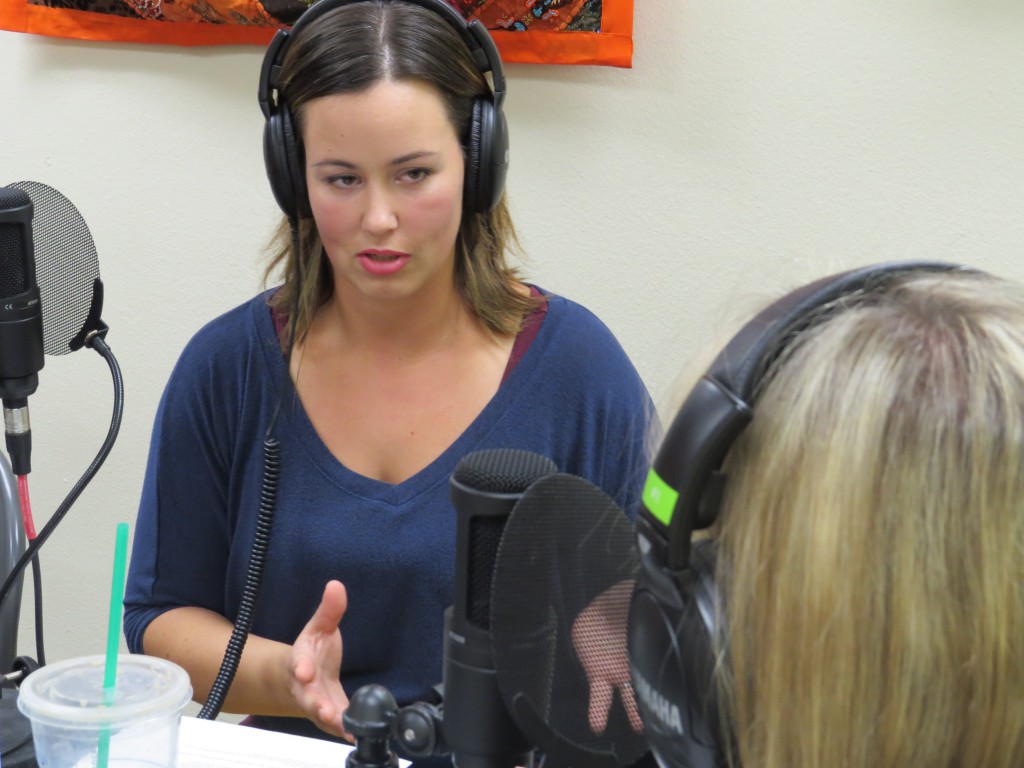The Boob Group
Successful Breastfeeding Stories: Miriam Valdez
[00:00:00]
Please be advised, this transcription was performed from a company independent of New Mommy Media, LLC. As such, translation was required which may alter the accuracy of the transcription.
LEILANI WILDE: We all have our own unique breastfeeding challenges. Overcoming those challenges and persevering can greatly empower you on your breastfeeding journey. Today, you'll hear from a mom who has experienced the tragedy of losing a child shortly after birth. Despite her grief, Miriam Valdez continued to breastfeed her older toddler until she was weaned. This is The Boob Group.
[Intro/Theme Music]
LEILANI WILDE: Welcome to The Boob Group broadcasting from the Birth Education Center of San Diego. The Boob Group is your weekly online, on-the-go support group for all things related to breastfeeding. I'm your host, Leilani Wilde. I'm also an IBCLC and owner of Leilani's Lactation and Doula Services.
If you love The Boob Group as much as we do, then please tell your friends about us so we can help them on their breastfeeding journey as well. If you haven't already checked out our free apps including our new network app where you can access all the New Mommy Media shows on-the-go. Now, Sunny is going to tell us how you can get involved with the show.
SUNNY GAULT: Hi everybody. We love listening to our listeners. We love hearing from our listeners and we have some segments you guys might like to participate in. There's a couple that I'll mention now, and this information is available in our website in www.NewMommyMedia.com. So, there are two segments that I'm going to talk about.
The first is all about different apps that help you breastfeed, that help you track pumping schedules and how much you pump for your baby. Let us know which apps that you guys have liked in the past because we're looking for different apps to talk about on the show. Of course, The Boob Groups have their own apps. New Mommy Media has their own apps. So we're all about providing you guys with the best content on-the-go, and so we'd love to talk about apps because again, we're all on-the-go parents, very busy, and apps can help us out a lot. So if you have any ideas, you can submit those.
The other thing is, we just want to hear from you guys on what ideas you have. Perhaps it's episode ideas, different topics you want to hear about in the future, perhaps you just want to comment on how an episode helped you get through a personal experience, or you just want to make suggestions for our show. We are all ears. It's kind of like our Boob Group Mail Bag, if you will.
You can submit for those segments in a couple of different ways. You can go to our website at www.NewMommyMedia.com, go to the Contact link and you can send us an email. And you can also call us on our voicemail and leave us a message. That number is 619-866-4775, and in that way you can actually use your own voice, leave the message that way, and we can just take that little snippet that you left for us and insert it in to a future episode so everyone can actually hear your voice.
Those are a couple of different options, but again, everything is on the website at www.NewMommyMedia.com.
[Theme Music]
LEILANI WILDE: So here's a question from one of our listeners. This is from Melissa and this is what she wrote.
"Hi, I have a question. My two-month-old prefers my right side over my left and my left seems slow compared to my right. When I put her on my left side first, she screams, so she nurses on the right only, for about five minutes. And then I put her back on the left and then she seems to nurse fine for a minute or two, and then starts smiling and then won't nurse at all. The only time she won't cry is when the left side is super full. Please help."
DAWN KERSULA: This is Dawn Kersula and I am an IBCLC and RN at Brattleboro Memorial Hospital in Brattleboro, Vermont. Melissa, I'm really glad to answer your question for you, and this sounds more like a management problem than anything else, but it also sounds like your baby has figured out the solution and is managing just fine.
Most babies do have a side preference for breasts. We tend to think it's an anatomy preference, but most often it's actually a flow preference. Interestingly, some babies prefer fast flow, and some babies prefer slow flow. And the utterly really fascinating thing is that most of us make more milk on the right side. And I'm guessing, since your baby prefers the right side, that your baby likes fast flow. And the reason that your baby is happy when you go second, to the left side, is that it's just fine when she'd had a let-down, because you know we have let-downs on both sides. You have a let-down on the right, you're also having a let-down on the left so when your baby goes there for dessert, the flow is faster.
I think you're doing exactly the right thing by starting on the right side and letting the baby have dessert on the left. And if that baby is smiling when they're done on the left side to ease it, that little bit of Ben and Jerry's at the very end was exactly what they needed and it finished the feed off very nicely. Now if the baby wasn't gaining weight, well we might worry more about this, but under the circumstances, I think that if you continue to do exactly what you're doing, and don't be afraid to start on the left side when it feels full because then again your flow is going to be a little faster on that side.
Do exactly what you've been doing. Follow your baby's lead. Follow your body's lead, and it's no wonder that baby is smiling. Happy Nursing!
[Theme Music]
LEILANI WILDE: Today on The Boob Group, we're continuing our ongoing series featuring moms who have overcome hurdles to breastfeed their babies. Miriam Valdez is a mother of three children. Miriam suffered the loss of her second child, who was only one month old. Miriam helped keep her child alive that first month by providing colostrum and breast milk, and she also continued to breastfeed her older toddler. Thank you for joining us, Miriam.
MIRIAM VALDEZ: Thank you so much for having me. I've never viewed myself as a success story, so this is completely new.
LEILANI WILDE: Welcome to our show. Just for the audience, can you tell us where you're from? I know that they're going to pick up on your accent.
MIRIAM VALDEZ: I was born and raised in Germany, and have since travelled with my husband across the world.
LEILANI WILDE: Wonderful. Thank you. Miriam, how old was Florentina, your first child, when you gave birth to Lucia, your second?
MIRIAM VALDEZ: Florentina was about 26 months.
LEILANI WILDE: 26 months? So were you still breastfeeding Florentina?
MIRIAM VALDEZ: Yes. She has always been an avid nurser. We overcame some struggles at the beginning with latch issues, and she had also some anatomical issues going on. So she was not going to give up easily. The doctor cautioned again, but as it is with military doctors, they switch frequently so the next one was on board with us continuing nursing during pregnancy.
LEILANI WILDE: Okay, good. Good. I know that sometimes there are doctors that don't always agree with tandem breast feeding or breast feeding during pregnancy because they're concerned that it could cause some complications. Is that what your first doctor said?
MIRIAM VALDEZ: Yes. She had pretty much threatened me. She threatened that I'm going to have a miscarriage and I need to stop straight away, and that was just not an option for us. But the next doctor, he just said "Yeah, it's fine". And he was also the doctor that delivered Lucia, so we had a rapport with him.
LEILANI WILDE: Awesome. That's wonderful. How did your breast feeding relationship change as you neared the birth of Lucia?
MIRIAM VALDEZ: Well, like it happens with toddlers that are nursed during pregnancy, once the milk changes to colostrum, they usually switch to comfort nursing or they even try to make it up with food or drinking water. She was already two years old, she did not have the nutritional need for breast milk, so I think it was more comfort measure for her, and she kept that. She always nursed for nap time, and for night time, and even sometimes at night. It significantly shortened.
LEILANI WILDE: And how far along into your pregnancy did that change? When was it that you noticed that your milk turned to colostrum?
MIRIAM VALDEZ: I want to say it was different in the second trimester, but I can't really say exactly because I never really saw my milk.
LEILANI WILDE: Did you see the difference in the changes of your feeding? Your baby's feeding behavior?
MIRIAM VALDEZ: Yes. She just stopped feeding as long. In the evening, she would latch for maybe a minute, and then would just turn over and fall asleep, which very nice.
LEILANI WILDE: Everyone got more sleep. Good. So can you briefly tell us what happened at the birth of Lucia?
MIRIAM VALDEZ: It was a series of misfortunate events, and I had a uterine rupture which resulted in a really emergency C-section. Nobody was in scrubs. It was really.. Field conditions as my doctor later said. Lucia was transported to the nearest hospital in Japan that had an NICU available. The hospital that did the C-section, it did not have any really critical condition measures, really. We later found out that she was not sufficiently ventilated, and since we don't know what damage she already had, she had major brain damage. And so that what lead to that, she was not able to breast feed or latch or even cry.
LEILANI WILDE: From the very beginning. I'm sorry. They were feeding her in some way. Is that correct? With the feeding tube?
MIRIAM VALDEZ: Yeah. After maybe two days, it's really hard for me to remember because I was heavily medicated. Luckily, they let me go see her fairly soon. First of all, there was a language barrier because it was a Japanese hospital. So, some nurses spoke some English. And then they told us that they were feeding her. I was surprised because I just had learned that she was out of critical condition, and feeding her did not occur to me.
I was still nursing my toddler, she - by the way - went right back to nursing. The separation caused some trauma to her too. Florentina, she really sought to be near me all the time. It was hard leaving her behind to go to the hospital and see Lucia. But yes, she really took back to a newer nursing schedule. So it did not occur to me to provide milk for Lucy, because she had a IV nutrition. I pumped because I was engorged at home and I just put it in the freezer, but that step to bring it to the hospital without being pumped, that did not occur to me at that moment.
LEILANI WILDE: Did they, at some point tell you that you could or is it your intuition or someone actually told you that you could bring that breast milk?
MIRIAM VALDEZ: I was provided a breast pump at the base hospital. Before they released me, they just gave me a pump. It was not even hospital grade pump because it was loaned out. It was very useful, I'm very grateful although it's only a single use pump. That was already something I learned later on. And I also was cautioned that they're not supposed to lend me the pump but it was the only thing they had, so we made do. That's what we do. We made do.
So I used that pump maybe only once or twice. Once in the hospital when they told us that they started feeding her, the next day, we brought in the pumped milk that I have. That's when they started feeding Lucia with the breast milk. It was not a large amount. She had a feeding tube so they started to feed her 1ml, up to 2ml when that went well.
What I found really interesting was that the milk was organized in little boxes in the freezer and everyone that had a baby in the NICU had their own box. And all the contents later when Lucy was transferred to the nearest NICU in Okinawa, the contents of that box went into a cooler, went in to the plane, and to the next hospital, without me even knowing.
The nurse just told us, "oh yeah all your milk came with her" and I thought it was really nice that they were looking out for the mom and baby at that point.
LEILANI WILDE: That's beautiful. Right. We know that breast milk is made specifically and designed specifically for each baby, correct?
MIRIAM VALDEZ: Yes.
LEILANI WILDE: And you were actually breast feeding now, two babies. Providing for both babies. Because you had your toddler, you were able to support your supply in regards to creating enough without having to go through all the pumping that you were going to need to do.
MIRIAM VALDEZ: Yes. I think Florentina saved my supply. If that would have happened with the first baby, I just imagined now, I would have had a lot of issues with my milk coming in, and establishing a supply. There was a pumping schedule and there was somebody taking the milk from my breasts, so I never had any issues. I would just pump so I could give something. It was in excess.
LEILANI WILDE: When we come back, we will discuss with Miriam the different obstacles she went through and how they might be similar to other breastfeeding moms and babies. We will be right back.
[THEME MUSIC]
LEILANI WILDE: Welcome back to the show. We are here with Miriam Valdez who's sharing her amazing breastfeeding story. We're always looking for moms to share their breastfeeding stories, and Sunny can explain more about that.
SUNNY GAULT: Yeah, so if you guys go to our website at www.NewMommyMedia.com, if you go to the section for The Boob Group. There's a banner up there and it says Share Your Breast Feeding Story.
You can also recommend someone or nominate someone's breastfeeding story if you know someone who has just an amazing story to tell. It could be an isolated incident. It could be just someone's overall breastfeeding experience and what they had to overcome.
We want to hear those stories because we want to do more episodes where we highlight different stories out there just to empower women out there who are breastfeeding and pumping for their babies. If you want to nominate someone, go to the website, click on that banner.
What's really great too is if we select the story, then the person comes on the show, they kind of get their own episode, and then our friends at Rumina Nursingwear are also going to provide them with some nice breast feeding apparelle. Please go ahead and nominate. It will be up there for a while, and we hope to hear from you guys soon.
LEILANI WILDE: Because you were separated at birth with Lucia, did they provide a pump for you to protect your milk supply?
MIRIAM VALDEZ: Yes. I'm not sure why, but I heard that the doctors were working on Lucia. I did not want to go see her at that point but also I'm not sure why I did not want to go see her. I just thought you know, "let the doctors do the work" and then she's going to be better and then I'll see her. She didn't get better. She was then transferred. The next morning, a lactation counselor came and she brought me a pump. It was not a hospital-grade pump, but I was happy with what I had because I was not prepared for a pumping incident. It was an easy pregnancy with no complications and we did not expect this at all.
LEILANI WILDE: So besides pumping, how else did you protect your milk supply?
MIRIAM VALDEZ: Well since my toddler is still frequently nursing, I think she did most of the work. And it also helped me a little bit because I had something to hold. I was holding her and.. It just helped me to have something there. And I could still do what I was supposed to do. And although I did have to be with it, I need it.
LEILANI WILDE: I know this is difficult. It's hard to go through this. But your story is going to help other moms in your situation if they ever have to face this, knowing that. For you, you did have your older child that you were able to continue breastfeeding, and in turn, your baby actually helped you recover and supports you through some of this difficult time through the breastfeeding relationship.
MIRIAM VALDEZ: Yes, definitely. That meant a lot. It was also a way for me to connect to her because with everything going on, I was so focused on other things that she took the comfort that she needed from me.
LEILANI WILDE: You both needed it.
MIRIAM VALDEZ: Yeah. I guess.
LEILANI WILDE: Yes.
MIRIAM VALDEZ: It wasn't always easy, you know, because when a toddler reverts back to a newborn feeding schedule, there was just not a lot of time to go see the newborn. But it worked out. We made it work.
LEILANI WILDE: You made it work, right? That's good. Tell us how you were supplying the expressed milk.
MIRIAM VALDEZ: The hospital in Okinawa gave us free breast milk storage bags and I just put it in there and didn't even put it in the freezer. It was only a five minute walk so I walked it straight down there. I pumped once in the evening and walked it down there. That was a little ritual. And the rest, the toddler took care of. So there were no issues with oversupply and the status and everything. I did not have all these newborn issues again. There was a really easy transition; I mean she knew what she was doing. All the first issues that I had with engorgement that did not happen this time. It was very convenient having a toddler helping out.
LEILANI WILDE: That's nice. And you were able to supply the milk for your other baby too, Lucia. That was special.
MIRIAM VALDEZ: She did not need very much, still. I mean even when she was about a month old. I think at the end they even stopped the breast milk because she couldn't handle it. So she was on full IV nutrition at that point. And we just kept going. We nursed I think for another eighteen months.
LEILANI WILDE: I know you had to make a really difficult decision. Can you tell us how you had to face that and what that was like?
MIRIAM VALDEZ: One day, she was probably about three weeks old; we got a call that Lucia had aspirated breast milk. She was fully ventilated at that time. And we were stuck in a traffic jam. We could not move. There was no way we could go faster to the hospital. But that amazing pediatrician, she recovered her. They talked about us, what we want to do. We decided that if she was not able to breathe on her own and if she was not able to use any food through the feeding tube that we would let her go. So that's what happened. They tried to change the breathing tube because she needed a bigger size and that time there was a chart to see if she would breathe on her own. She didn't.
LEILANI WILDE: You know that's a long journey for you to have to face if you decided to keep her sustained with the medical interventions, right? And you were trying to think of your older child as well and your relationship with your husband, and the life of your new baby. I mean that was a big decision.
MIRIAM VALDEZ: Yeah. I mean the doctors were supportive of any decision we would have made. If we would have said no, we want to keep her on life support, there were options. We could have her permanently on a ventilator and permanently on IV nutrition but there is a limit to what a body can handle with IV nutrition.
They told us that the life expectancy would probably have been two years, and we could already see that she was already having contractions from the cerebral palsy she had sustained due to the oxygen deprivation.
So it was either having to go because we did not think that the aspiration of breast milk was going to be an isolated incident. She would always be aspirating something, even if it was not directly from the stomach if the tube was placed through her abdomen. There was always going to be something. And 24/7 care in the family, even if you have the support of a nurse. You know as a parent you always run, you hear the alarm going off and you run.
So we just decided that Florentina already lost her sister. So she deserved to have some sort of normal life.
LEILANI WILDE: And so you were able to continue your breastfeeding relationship for your toddler, correct? And how much longer were you able to continue breastfeeding?
MIRIAM VALDEZ: We breastfed probably for at least another eighteen months. I don't know exactly when she stopped. And now that I figured once she started SureStart which is similar to HeadStart, that it may be difficult if she would still be asking for milk.
Today, I would probably think, you know, what's the big deal? But at that point, my mom always kept asking, "don't you think she's too old?" Or you know my husband asked, "don't you think it's time to stop at some point?" But it just helped both of us. Slowly, we stopped. One session after the other, I would not nurse her for nap time and then not for bedtime. And it changed. Probably took about three days to implement, and then she let it go fairly easily. And we found that a wave of comfort. She did well.
LEILANI WILDE: So she was how old exactly when she stopped breastfeeding?
MIRIAM VALDEZ: At least three and a half. It could have been closer to four. I'm not sure.
LEILANI WILDE: And that in itself is a success story right there. Because there are a lot of moms out there that wonder or should, they don't even think about, like can they breastfeed past you know a year. And I think it's just wonderful that you were able to continue that breastfeeding relationship with your older baby.
MIRIAM VALDEZ: Yeah. She was a C-section, and since I did not manage, that's why I thought I did not manage a normal birth the way I thought it was going to go, I'm going to do this breastfeeding thing. That's what we did. We just didn't stop. We both stopped until this day.
LEILANI WILDE: That's wonderful. Thank you so much, Miriam, for sharing this incredible story with us. We are so honored to have you on our show today and your willingness to be open with us. And for our Boob Group Club Members, our conversation will continue after the end of this show as Miriam will share with us how she has influenced other moms because of this. For more information about our Boob Group Club, please visit our website at www.NewMommyMedia.com.
[THEME MUSIC]
DENISE ALTMAN: Hey there Boob Group. My name is Denise Altman and I'm a private practice IBCLC, otherwise known as a registered lactation consultant. Private practice means that I have my own business, and I specialize in prenatal education and breastfeeding support. This session is about prenatal class breastfeeding. Something I definitely have an opinion about. In addition, this session is for grandmas and daddies and other support persons helping the breastfeeding momma.
Daddies in particular can really make or break a breastfeeding experience. Oftentimes that important partner is Mom's greatest advocate. When the partner is the daddy and the dad is attending the class, most men think differently than women think. Daddies are great for remembering diaper counts, time, and duration of feedings, that sort of thing. And will start taking notes about that, mental notes about that as facts and topics during the class itself.
When mom is in that emotional tailspin of being a new mother all wrapped up in that baby and that feeding experience, oftentimes, it's dad who's the one who can kind of pull out these facts from his memory and use that male analytical thinking to help be supportive and help her figure a way through any difficulties or challenges.
Grandmas are a great resource in the breastfeeding classes especially. Many grandmas in my experience are very interested in breast feeding. They've heard enough through the media to know that this is how things are being done in this day and age, but often grandma herself did not breastfeed or did not have a positive breastfeeding experience. If grandma is educated prenatally, it's far more likely that she will be a help and advocate for momma. I love it when I see grandmas coming to feeding consultations or sitting in class because often they have lots of good comments and suggestions about baby care that just help momma as well.
I hope that the information in this session can get you started on exploring your options. For additional tips on breastfeeding class, please visit my website at www.FeatureBaby.com and keep listening to The Boob Group.
LEILANI WILDE: That wraps up our show for today. We appreciate you listening to The Boob Group.
Don’t forget to check out our sister shows:
• Preggie Pals for expecting parents
• Newbies for newly postpartum moms and their babies
• Parent Savers for moms and dads with infants and toddlers
• Twin Talks, for parents of multiples.
Thanks for listening to The Boob Group: “Your judgment-free breastfeeding resource.”
[Disclaimer]
This has been a New Mommy Media production. Information and material contained in this episode are presented for educational purposes only. Statements and opinions expressed in this episode are not necessarily those of New Mommy Media and should not be considered facts. Though information in which areas are related to be accurate, it is not intended to replace or substitute for professional, Medical or advisor care and should not be used for diagnosing or treating health care problem or disease or prescribing any medications. If you have questions or concerns regarding your physical or mental health or the health of your baby, please seek assistance from a qualified health care provider.
SUNNY GAULT: New Mommy Media is expanding our line up of shows for new and expecting parents. If you have an idea for a new series or if you’re a business or an organization interested in joining our network of shows through a co-branded podcast, visit www.NewMommyMedia.com.
[00:28:04]
[END OF AUDIO]














